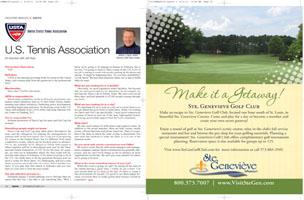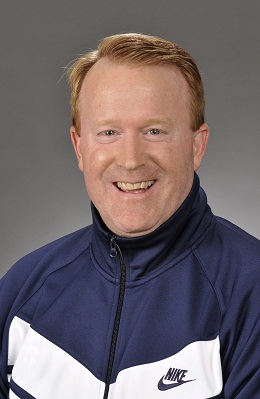
Organization: U.S. Tennis Association (USTA)
|
Jeffrey J. Ryan, Senior Director, USA Team Events |
Website: www.usta.com
You've been there since: 1997
Definition: USTA is the national governing body for tennis in the United States, and oversees play from the grassroots to the professional level.
Membership: More than 750,000 individuals
USTA is responsible for: Sanctioning competitive events at all levels, promoting community tennis initiatives such as 10 and Under Tennis, implementing new player initiatives, furthering junior development, promoting league play and more. Its showcase event is the U.S. Open, held annually at the USTA Billie Jean King National Tennis Center in Flushing, N.Y.
You're responsible for: In-house promotion of Davis Cup (for men) and Fed Cup (for women).
Something people might not know: Davis Cup and Fed Cup play takes place throughout the year, and the obligation for making the arrangements for matches falls on the host nation. Part of my job is prospecting for venues in the United States, but it's different from many competitive events, which can be booked years in advance. For us, the schedule we're obliged to follow with regard to where matches will be is determined each year by the International Tennis Federation, or ITF. So for the men, for example, we find out in September where the first round will be, and that takes place in February. If we learn it's going to be in the U.S., we really have to hit the pavement because now we need a venue for those dates. It's challenging, and not a time frame everyone can work with. Of course, there's another scenario: If you play that first match in February and you win, then it's your turn to host the next round.
Our site selection process is.... Definitely unique! I would challenge you to find any other situation like this one. I am able to say something like, 'Well, I know we're going to be playing in Russia in February, but if we win, I'm going to need to find a venue in the U.S. A lot of my job is staying in touch with people, picking up the phone and saying, 'It might be happening here. Do you have availability? Let me know.' We have had situations where we've had to build what we want.
What are you looking for in a facility? Obviously, we need regulation tennis facilities, but beyond that, we need good capacity for spectators. As an example, we just had the Davis Cup in Austin, Texas. We were sold out all three days, and had upwards of 47,000 people coming through our doors.
What are you looking for in a city? It's important for us to look at a city we've never been to so we can spread the good word of tennis there. When I'm looking for Davis and Fed Cup specifically, I need good connectivity in terms of travel in and out of the area, high-quality hotels, and strong sponsorship support from the local community.
What else? We also need venues for both indoor and outdoor events. In addition to the actual matches, there are kids' events, media events, official functions and private functions. Then of course, there's the draw in which the order of play is determined. You wait until that weekend to make the draw, so it is one of the featured events.
Do you work with sports commissions and CVBs? We tend to work directly with arena managers and management companies instead. Sports commissions are generally risk-averse, and we can't book things as far in advance as most organizations would like. We can't give easy answers for where we're going to be next.
What is the most rewarding aspect of your job?
When the event is going on, and I'm seeing all the fans in the stands having a great time, I really do get a buzz. I'm very proud what we've done in the last 14 years to create a fun environment for people. It's good to see them happy because you know they've really gotten their money's worth as a spectator.

